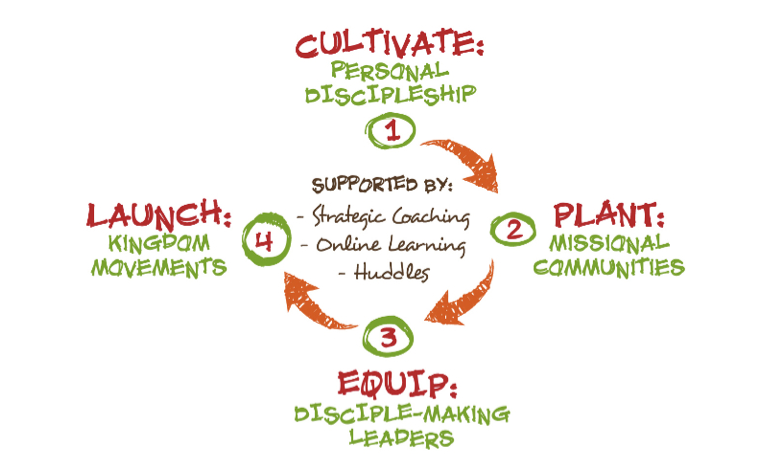What is church planting? It’s not a trend, a niche calling, or a strategy for ambitious pastors. It’s the clearest expression of obedience to the Great Commission. From the moment Jesus said “Go,” the Church was meant to multiply.
Yet today, too many leaders treat church planting like a side project—nice if it happens, but not essential. That mindset is killing momentum and confusing the mission.
If your church isn’t planting, it’s not growing—it’s coasting.
Church planting forces clarity:
- You’ll know who you are when you're stripped of comfort and forced to lead.
- Your team will unify around mission or fall apart trying.
- You’ll stop hiding behind church busywork and confront whether you're making disciples or just hosting events.
This isn’t theory. It’s Bible. Jesus commanded it. Paul embodied it. The early Church died for it.
This guide will show you why church planting isn’t just important—it’s the Church’s primary assignment. Today, we're going to cover off some the biggest questions about church planting. Keep reading to find out:
- What is church planting?
- What The Great Commission says about church planting
- How the Apostle Paul planted churches
- Why church planting matters
- 5 church plants to look out for
- Why should you join a church plant
- Why church planting isn't for everyone
What is church planting?
All the best church planting books will tell you: church planting is starting a new church from an existing church.
Church planting fulfills the mission of God in every place, space and context in which we find ourselves. Its activity is rooted in Jesus’ instructions in the New Testament Bible.
In Discovering Church Planting, JD Payne reads this out of the Great Commission of Matthew 28. For Payne, church planting “tells us how to make disciples” and “offers a paradigm for reaching villages, tribes urban enclaves and entire cities with the gospel.” He is on-to something important here about scope and why to talk about it.

If the church is understood as the people of God, then where on earth (or beyond) can people (boldly) go that the church cannot go? Where can nations exist without the people who establish its culture, laws and structures?
It follows that where the people are, there can be the church. Where the church is, there is Jesus Christ. If new churches are not reaching the unreached people of the future, then who will? What activity can?
Biblical Foundations: Church Planting in Scripture
Church planting, then, is not just one of many different strategies and practices that respond to the Great Commission of Jesus. It is the best strategy and the best practice. Experienced church planters Roger McNamara & Ken Davis make this clear. In The Y-B-H Handbook of Church Planting, they suggest that:
"Church planting best fulfills the directives and goals of the Great Commission because as churches are planted in every nation, disciples are made in that nation just as Christ commanded should be done.”
Roger McNamara & Ken Davis
In the Bible these new, local churches are reproduced out of an existing church from somewhere else. The people of God in one place with one people group establish a community of the people of God in another place and another group.
It is that simple—in words. It is much more difficult when the rubber-hits-the-road. The lives of the twelve apostles, new believers, and the Apostle Paul in the Book of Acts reveal the stakes: church planting either costs or very nearly cost them their lives (c.f. Acts 7; 12; 27).
How the Apostle Paul planted churches
The Apostle Paul’s theology and practice make church planting integral to God's mission. The Jesus Film Project highlights in their blog how Paul's missiology of church planting fuelled his missionary journeys. His training and appointing of local leadership in new churches filled with new believers reveals his desire to multiply the global through the local church. This emphasis is picked up by Chris Bowers and Scott Zeller in their blog too.
Dangerous as it might have been, church planting as a practice was not stopped because the future of Christianity was, for Paul, the greater cost. McNamara and Davis say that the Apostle Paul in particular “did many things, but he never neglected” the practice of “planting new churches.” In the end, Paul ran the race and fought the fight of church planting (c.f. 2 Tim 4:7)
This cursory review or preliminary Bible study on the topic strongly suggests that church planting should be at the tip of the missional spear. The Great Commission of Jesus, the Book of Acts, and the theology and practice of the Apostle Paul demand it.
Why Church Planting Can’t Wait: 2025
The activity and priority of planting churches in the Bible is a foundation for all disciples today, because the world still holds a very great many people who do not know or follow Jesus Christ. “Church planting is needed,” says James R. Nikkel, in Church Planting Road Map, “because new communities need to be reached for Christ.”
This demands some understanding of the past and present of 2022 but much response of the future of 2025 and beyond. Starting with understanding the cultural moment now, Christopher James, in Church Planting in Post-Christian Soil, paints a detailed and methodical picture of the great expanse and rise of secularity in North America in the last 50 years. It seems apparent to James that in Western culture God is more fantasy than fact—believed in by the minority, not the majority of people.
Church planting is relevant
What does surprise about James’ work, however, is his analysis of the minority, Christian church. James says,
“Rather than demoralizing the faithful, the minority status of confessional Christians seems to counterintuitively contribute to the vitality of their religious identity and mission.”
Christopher James
In other words, he believes that the mission of God has never been more relevant. If the mission of God is in a context of vitality, then the same stands for planting churches. Though secularism may be dominant, James believes paradoxically it has “proved to be a rather fertile environment for fervent Christianity.” People are ready. The time for planting is now.
This demands a response.
But this comes down to how the church responds. The people of God today, like those of yesterday, need to establish communities of the people of God for tomorrow.
It matters because there will also be robust minority of Christians who can assess their role and calling in the outworking of the mission of God.
This means that anyone, whether a follower of Jesus or not, should think in some way about how this impacts their personal and corporate future. Below or some areas for you to consider in this process of discernment.
Should you Help start a church?
If you are excited about Christian missions and you want to discover your life's passion, then you should join a church plant in 2025. It is those who join-in and plant churches that are also the ones who establish the short- and long-term future of Christianity. Learning from the best church growth resources available can equip you for this vital mission.
“We discovered that churches that have a DNA of reproduction are among the most effective churches at reaching the lost and unchurched across America.”
Thom Rainer
Here, in the book Church Planting from the Ground Up, Rainer and other church planters suggest that there is no better context for fulfilling your passion in Jesus in reaching the world than in a church plant.
The passion of evangelism and multiplication naturally spills out of one new church plant and into another. It is like wild fire. David Garrison speaks as such in, Church Planting Movements. Whereas “church planters may start the first churches” he goes on to say that other “churches themselves get into the act” and the birth of a movement occurs. Local churches in these areas go the extra mile, not giving up on discipleship, spiritual development or worship.
Being part of a movement is special. For church planters and bloggers, like Steve Sjogren, it creates a momentum that should cause us to "rejoice, if you have it. The calling and passion is worth it!
Related Read: What Every Lead Pastor Needs To Know About Church Metrics.
Further reading
If you're starting a church, check out our list of the best church management software.
To better manage your Church's growth, check our list out of the 10 Top Church Technology Resources For Leaders and find more church growth strategies here.
What do you think?
If you've ever wondered how the big churches do it, here's a peek into their world: 10 Biggest Streaming Churches And The Software They Use.
Related Read: 10 Best Worship Presentation Software For Mac





